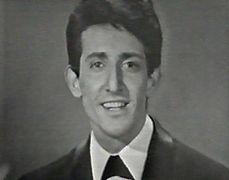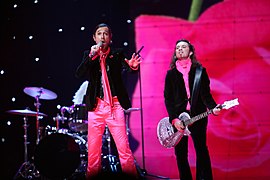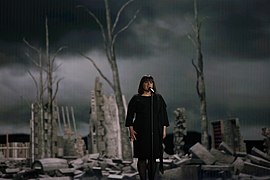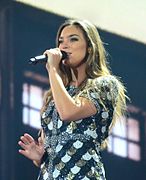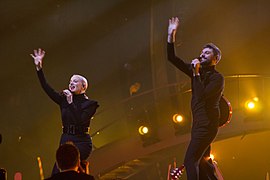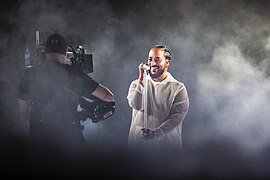Франция в конкурсе песни Евровидения
| Франция в конкурсе песни Евровидения | |
|---|---|

| |
| Участие вещатель | Франция Телевизии (2001 - Присутствует)
Ранее |
| Краткое изложение участия | |
| Появления | 66 |
| Первое появление | 1956 |
| Наибольшее размещение | 1 -й: 1958 , 1960 , 1962 , 1969 , 1977 |
| Хозяин | 1959 , 1961 , 1978 |
История участия
| |
| External links | |
| France 2 page | |
| France's page at Eurovision.tv | |
France in the Eurovision Song Contest 2024 | |
Франция участвовала в конкурсе песни Евровидения 66 раз с момента своего дебюта на первом конкурсе в 1956 году . Франция - одна из семи стран, присутствующих на первом конкурсе, и отсутствовала только в двух соревнованиях в своей истории, пропустив соревнования 1974 и 1982 годов . С 2001 года французским участником вещателя является Франция Телевизии . Наряду с Германией , Италией , Испанией и Соединенным Королевством Франция является одной из стран « Большой пятерки », которые автоматически предварительно квалифицированы для финала, из -за того, что их участники вещатели являются крупнейшими финансовыми участниками Европейского союза вещания (EBU). Франция выиграла конкурс пять раз.
Франция впервые выиграла конкурс в 1958 году с « Dors, Mon Amour », исполненным Андре Клаво . В 1960 -х годах последовали еще три победы, когда « Том Пиллиби » исполнял Жаклин Бойер в 1960 году , « Премьер Амур ООН », исполняемый Изабель Обрет в 1962 году и « ООН -Журнал, ООН -Энфант », исполняемая Фрида Боккара , которая выиграла в 1969 году в 1969 году в 1969 году в 1969 году в 1969 году. Четырехсторонняя связь с Нидерландами , Испанией и Великобританией . Пятая победа Франции пришла в 1977 году с песней « L'Oiseau et l'Enfant », исполненной Мари Мириам . Во время успешного заезда в 20 -м веке Франция также финишировала вторым четыре раза, с « La Belle Amour » Пола Дежардинс ( 1957 ), « Un, Deux, Trois » Кэтрин Ферри ( 1976 ), « Белый и черный блюз » Жоэль Урсулл ( 1990 ) и « C'est Le Dernier Qui A Parlé Qui A Raison » от Амины ( 1991 ), которая проиграла Швеции " Fångad av en Stormvind " Carola в тай-брейке.
After reaching the top five in 24 contests in the 20th century, France has had less success in the 21st century, only making the top five four times, with "Je n'ai que mon âme" by Natasha St-Pier fourth (2001), "Il faut du temps" by Sandrine François fifth (2002), "Voilà" by Barbara Pravi second (2021), and "Mon amour" by Slimane fourth (2024). France's other top 10 results in the century are "Et s'il fallait le faire" by Patricia Kaas eighth (2009), and "J'ai cherché" by Amir sixth (2016). France finished last for the first time in 2014, when "Moustache" by Twin Twin received only two points.
Organisation
[edit]Several national broadcasters have successively participated in the contest representing France over the years: Radiodiffusion-Télévision Française (RTF; 1956–1964), Office de Radiodiffusion Télévision Française (ORTF; 1965–1974), Télévision Française 1 (TF1; 1975–1981), Antenne 2 (1983–1992), and France Télévision (1993–2000). Since 2001, France Télévisions is who participates representing France, with the final being broadcast on France 2 (1993–1998, 2015–present) and France 3 (1999–2014), and the semi-final which France votes in was broadcast on France 4 (2005–2010, 2016–2019), later France Ô (2011–2015) and since 2021, Culturebox. The semi-final in 2004 was not broadcast; viewers who were close enough to Monaco were able to watch that year's semi-final via TMC Monte-Carlo. Radio coverage has been provided, although not every year or since 2013, by France Inter from 1971 to 1998 and from 2001 to 2012, France Bleu (also in 1976). In 1982, RTL Radio transmitted the contest due to the country's absence that year.
The process to select the French entry in the contest has changed over the years, with either a national final or an internal selection (occasionally a combination of both formats) having been held.
Contest history
[edit]France is one of the most successful countries in Eurovision, winning the contest five times, coming second five times and coming third seven times. However, France has only hosted the contest three times (1959, 1961, and 1978).[1] France was ranked first in number of victories (either alone or tied with other countries) without interruptions from 1960 to 1993. Moreover, "C'est le dernier qui a parlé qui a raison" performed by Amina was close to victory in 1991, when it finished in joint first place with the same number of points as Sweden. Therefore, the 'countback' rule applied, but both countries had an equal number of twelve points (four lots), but the victory went to Sweden, when France had fewer 10-point scores. With the current rules in place, France would have won the competition, because they received points from more countries than Sweden. One year before, France was also close to winning with "White and Black Blues" by Joëlle Ursull. The song finished in joint-second place with Ireland's entry.
However, in recent years, the French results have been mixed. Since 1998, when the televoting was introduced, France has almost always ranked in the bottom 10 countries in the final, coming 15th (2004), 16th (2019 and 2023), 18th (2003 and 2008), 19th (1999 and 2008), 22nd (2006, 2007, and 2012), 23rd (2000, 2005, and 2013), 24th (1998 and 2022), 25th (2015), and 26th (last place, for the first time in its Eurovision history) in 2014.
France has had some good results during the 21st century. In 2001, "Je n'ai que mon âme" performed by Canadian singer Natasha St-Pier came fourth, being the favourite to win the contest by fans and odds. This good result was carried into the 2002 contest, when "Il faut du temps" by Sandrine François came fifth and received the Marcel Bezençon international press award for the best entry of that year. The positive experience with Sébastien Tellier in 2008 created considerable interest among the French showbiz for the contest, which resulted in Eurovision being seen by the French media as a valuable advertising campaign. With these ambitions, Patricia Kaas represented France in the 2009 contest with "Et s'il fallait le faire", finishing in eighth place. Kaas received the Marcel Bezençon artistic award, which was voted on by previous winners and presented to the best artist. In the 2016 contest, Amir with his song "J'ai cherché" ended in sixth place and broke a 40-year record by scoring the most points in France's Eurovision history, by scoring 257 points in the final. That record would later be broken once again in 2021, as Barbara Pravi with her song "Voilà" finished in second place with 499 points, France's best result since 1991, only 25 points behind eventual winners Måneskin from Italy. Slimane finished in fourth place in 2024 with his song "Mon amour".
Absences
[edit]Since its debut in 1956, France has only missed two contests, in 1974 and 1982. In 1974, after selecting a singer and song to represent the country at the contest, France withdrew after the French president Georges Pompidou died in the week of the contest.[2] If it had participated, France would have been represented by Dani with the song "La Vie à vingt-cinq ans".
In November 1981, TF1 declined to enter the Eurovision Song Contest for 1982, with the head of entertainment, Pierre Bouteiller, saying, "The absence of talent and the mediocrity of the songs were where annoyance set in. Eurovision is a monument to inanity [sometimes translated as "drivel"]."[3] Antenne 2 took over due to the public reaction to TF1's withdrawal, hosting a national final to select the French entry as well, from the 1983 contest.
France and the "Big Five"
[edit]Since 1999, France, along with Germany, Spain, and the United Kingdom, have automatically qualified for the Eurovision final regardless of their results in previous contests.[4] The participant broadcasters from these countries earned this special status by being the four biggest financial contributors to the EBU, and subsequently became known as the "Big Four". Italy returned to the contest in 2011, thus upgrading the countries to members of a "Big Five".[5][6]
Participation overview
[edit]| 1 | First place |
| 2 | Second place |
| 3 | Third place |
| ◁ | Last place |
| X | Entry selected but did not compete |
| † | Upcoming event |
Hostings
[edit]| Year | Location | Venue | Presenters |
|---|---|---|---|
| 1959 | Cannes | Palais des Festivals | Jacqueline Joubert |
| 1961 | |||
| 1978 | Paris | Palais des Congrès | Denise Fabre and Léon Zitrone |
Awards
[edit]Marcel Bezençon Awards
[edit]| Year | Category | Song | Composer(s) lyrics (l) / music (m) |
Performer | Final | Points | Host city | Ref. |
|---|---|---|---|---|---|---|---|---|
| 2002 | Press Award | "Il faut du temps" | Rick Allison (m), Patrick Bruel (m&l), Marie-Florence Gros (l) | Sandrine François | 5 | 104 | ||
| 2009 | Artistic Award[c] | "Et s'il fallait le faire" | Anse Lazio, Fred Blondin | Patricia Kaas | 8 | 107 | ||
| 2011 | Composer Award | "Sognu" | Daniel Moyne (m), Quentin Bachelet (m), Jean-Pierre Marcellesi (l), Julie Miller (l) |
Amaury Vassili | 15 | 82 | ||
| 2018 | Press Award | "Mercy" | Émilie Satt (m&l), Jean-Karl Lucas (m&l) | Madame Monsieur | 13 | 173 | ||
| 2021 | Press Award Artistic Award[d] |
"Voilà" | Barbara Pravi, Lili Poe, Igit (m&l) | Barbara Pravi | 2 | 499 |
Winner by OGAE members
[edit]| Year | Song | Performer | Final | Points | Host city | Ref. |
|---|---|---|---|---|---|---|
| 2016 | "J'ai cherché" | Amir | 6 | 257 |
Related involvement
[edit]Conductors
[edit]| Year | Conductor[e] | Musical Director | Notes | Ref. |
|---|---|---|---|---|
| 1956 | Franck Pourcel | N/A | [14] | |
| 1957 | ||||
| 1958 | ||||
| 1959 | Franck Pourcel | [f] | ||
| 1960 | Franck Pourcel | N/A | ||
| 1961 | Franck Pourcel | [g] | ||
| 1962 | Franck Pourcel | N/A | ||
| 1963 | ||||
| 1964 | ||||
| 1965 | ||||
| 1966 | ||||
| 1967 | ||||
| 1968 | Alain Goraguer | |||
| 1969 | Franck Pourcel | |||
| 1970 | [15] | |||
| 1971 | ||||
| 1972 | ||||
| 1973 | Jean Claudric | |||
| 1974 | Jean-Claude Petit | [h] | ||
| 1975 | Jean Musy | |||
| 1976 | Tony Rallo | |||
| 1977 | Raymond Donnez | |||
| 1978 | Alain Goraguer | François Rauber | ||
| 1979 | Guy Matteoni | N/A | ||
| 1980 | [i] | [16] | ||
| 1981 | David Sprinfield | |||
| 1983 | François Rauber | |||
| 1984 | ||||
| 1985 | Michel Bernholc | [j] | ||
| 1986 | Jean-Claude Petit | |||
| 1987 | ||||
| 1988 | Guy Matteoni | |||
| 1989 | ||||
| 1990 | Régis Dupré | |||
| 1991 | Jérôme Pillement | |||
| 1992 | Magdi Vasco Noverraz | |||
| 1993 | Christian Cravero | |||
| 1994 | Alain Goraguer | |||
| 1995 | Michel Bernholc | |||
| 1996 | ||||
| 1997 | Régis Dupré | |||
| 1998 | Host conductor[k] | |||
| 1999 | No orchestra | [l] | ||
| 2000 | ||||
Heads of delegation
[edit]| Year | Head of delegation | Ref. |
|---|---|---|
| 2002–2012 | Bruno Berberes | |
| 2013–2015 | Frederic Valencak | |
| 2016–2018 | Edoardo Grassi | |
| 2019 | Steven Clerima | |
| 2020–present | Alexandra Redde-Amiel |
Commentators and spokespersons
[edit]This section needs additional citations for verification. (May 2020) |
Since its debut in 1956, French broadcasters has sent commentators to provide coverage on the contest, including Robert Beauvais and Léon Zitrone. During the 1960s, its commentators was relayed in Luxembourg, Monaco, and French-speaking Switzerland.
| Year | Commentator | Spokesperson | Ref. | |
|---|---|---|---|---|
| Final | Semi-final | |||
| 1956 | Michelle Rebel | No semi-finals | No spokesperson | [22] |
| 1957 | Robert Beauvais | Claude Darget | [23] | |
| 1958 | Pierre Tchernia | Armand Lanoux | [24] | |
| 1959 | Claude Darget | Marianne Lecène | [25] | |
| 1960 | Pierre Tchernia | Armand Lanoux | [26] | |
| 1961 | Robert Beauvais | [27] | ||
| 1962 | Pierre Tchernia | André Valmy | ||
| 1963 | Armand Lanoux | |||
| 1964 | Robert Beauvais | Jean-Claude Massoulier | ||
| 1965 | Pierre Tchernia[28] | |||
| 1966 | François Deguelt | |||
| 1967 | Pierre Tchernia[29] | |||
| 1968 | ||||
| 1969 | ||||
| 1970 | ||||
| 1971 | Georges de Caunes | No spokesperson | ||
| 1972 | Pierre Tchernia | |||
| 1973 | ||||
| 1974 | Did not participate | |||
| 1975 | Georges de Caunes | Marc Menant | ||
| 1976 | Jean-Claude Massoulier | |||
| 1977 | Georges de Caunes | |||
| 1978 | Léon Zitrone[30] | Patrice Laffont | ||
| 1979 | Marc Menant | Fabienne Égal | ||
| 1980 | Patrick Sabatier | |||
| 1981 | Denise Fabre | |||
| 1982 | Andre Torrent | Did not participate | ||
| 1983 | Léon Zitrone | Nicole André | ||
| 1984 | ||||
| 1985 | Patrice Laffont | Clémentine Célarié | ||
| 1986 | Patricia Lesieur | |||
| 1987 | Patrick Simpson-Jones | Lionel Cassan | ||
| 1988 | Lionel Cassan | Catherine Ceylac | ||
| 1989 | Marie-Ange Nardi | |||
| 1990 | Richard Adaridi | Valérie Maurice | ||
| 1991 | Léon Zitrone | Daniela Lumbroso | ||
| 1992 | Thierry Beccaro | Olivier Minne | ||
| 1993 | Patrice Laffont | |||
| 1994 | Laurent Romejko | |||
| 1995 | Olivier Minne | Thierry Beccaro | ||
| 1996 | Laurent Broomhead | |||
| 1997 | Frédéric Ferrer and Marie Myriam | |||
| 1998 | Chris Mayne, Laura Mayne | Marie Myriam | ||
| 1999 | Julien Lepers | |||
| 2000 | ||||
| 2001 | Marc-Olivier Fogiel, Dave | Corinne Hermès | ||
| 2002 | Marie Myriam | |||
| 2003 | Laurent Ruquier, Isabelle Mergault | Sandrine François | ||
| 2004 | Laurent Ruquier, Elsa Fayer | No broadcast | Alex Taylor | |
| 2005 | Julien Lepers, Guy Carlier | Peggy Olmi | Marie Myriam | |
| 2006 | Michel Drucker, Claudy Siar | Peggy Olmi, Eric Jean-Jean | Sophie Jovillard | |
| 2007 | Julien Lepers, Tex | Peggy Olmi, Yann Renoard | Vanessa Dolmen | |
| 2008 | Julien Lepers, Jean-Paul Gaultier | Cyril Hanouna | ||
| 2009 | Cyril Hanouna, Julien Courbet | Yann Renoard | ||
| 2010 | Cyril Hanouna, Stéphane Bern | Audrey Chauveau | ||
| 2011 | Laurent Boyer, Catherine Lara | Audrey Chauveau, Bruno Berberes | Cyril Féraud | |
| 2012 | Cyril Féraud, Mireille Dumas | Amaury Vassili | ||
| 2013 | Marine Vignes | |||
| 2014 | Cyril Féraud, Natasha St-Pier | Elodie Suigo | ||
| 2015 | Stéphane Bern, Marianne James | Mareva Galanter, Jérémy Parayre | Virginie Guilhaume | |
| 2016 | Marianne James, Jarry | Élodie Gossuin | ||
| 2017 | Stéphane Bern, Marianne James, Amir | |||
| 2018 | Stéphane Bern, Christophe Willem, Alma | Christophe Willem, André Manoukian | ||
| 2019 | Stéphane Bern, André Manoukian | Sandy Héribert, André Manoukian | Julia Molkhou | |
| 2021 | Stéphane Bern, Laurence Boccolini | Laurence Boccolini | Carla | |
| 2022 | Élodie Gossuin | |||
| 2023 | Anggun, André Manoukian | Anggun | ||
| 2024 | Nicky Doll | Natasha St-Pier | ||
Photo gallery
[edit]-
André Claveau in Hilversum (1958)
-
Guy Mardel in Naples (1965)
-
Dan Ar Braz in Oslo (1996)
-
Jonatan Cerrada in Istanbul (2004)
-
Les Fatals Picards in Helsinki (2007)
-
Sébastien Tellier in Belgrade (2008)
-
Patricia Kaas in Moscow (2009)
-
Jessy Matador in Oslo (2010)
-
Amaury Vassili in Düsseldorf (2011)
-
Amandine Bourgeois in Malmö (2013)
-
Lisa Angell in Vienna (2015)
-
Madame Monsieur in Lisbon (2018)
-
Bilal Hassani in Tel Aviv (2019)
See also
[edit]- France in the Junior Eurovision Song Contest – Junior version of the Eurovision Song Contest.
- France in the Eurovision Young Dancers – A competition organised by the EBU for younger dancers aged between 16 and 21.
- France in the Eurovision Young Musicians – A competition organised by the EBU for musicians aged 18 years and younger.
Notes
[edit]- ^ Jump up to: a b The 1956 contest had secret voting and, apart from the winner, no results were released.
- ^ The 2020 contest was cancelled due to the COVID-19 pandemic.
- ^ Voted by previous winners.
- ^ Voted by the national commentators.
- ^ All conductors are of French nationality unless otherwise noted.
- ^ Also conducted for Austria, Germany, Monaco, Sweden, and Switzerland
- ^ Also conducted for Austria and Germany
- ^ Announced as the French conductor prior to the country's withdrawal
- ^ Conducted at the national final by François Rauber
- ^ Conducted at the national final by François Rauber.
- ^ Koch conducted a small string arrangement added to the performance over the course of rehearsals; he did not take the traditional conductor's bow.
- ^ Although the international final did not feature the orchestra, there was one for the national final, conducted by Rene Coll.
References
[edit]- ^ "History by Events". Eurovision Song Contest. Archived from the original on 25 August 2017. Retrieved 4 March 2020.
- ^ History - Eurovision Song Contest 1974 Eurovision.tv
- ^ 1982 Eurovision source in French
- ^ O'Connor, John Kennedy (2005). The Eurovision Song Contest 50 Years The Official History. London: Carlton Books Limited. ISBN 1-84442-586-X.
- ^ "SERBIA - Svante Stockselius meets members of OGAE Serbia". Archived from the original on 12 February 2010. Retrieved 24 May 2009.
- ^ Fulton, Rick (14 May 2007). "The East V West Song Contest". Daily Record. Retrieved 24 May 2009.
- ^ Jiandani, Sanjay (30 August 2024). "France: France 2 confirms participation at Eurovision 2025". ESCToday. Retrieved 30 August 2024.
- ^ "Marcel Bezençon Awards". eurovision.tv. 2 April 2017. Archived from the original on 16 July 2019. Retrieved 8 December 2019.
- ^ Klier, Marcus (18 May 2009). "The Eurovision 2009 Marcel Bezençon Awards". esctoday.com. Retrieved 8 December 2019.
- ^ "Winners of the Marcel Bezençon Awards". eurovision.tv. 16 May 2011. Retrieved 8 December 2019.
- ^ "Here are the winners of the Marcel Bezençon Awards 2018!". eurovision.tv. 12 May 2018. Retrieved 8 December 2019.
- ^ "The Marcel Bezençon Award". 22 May 2021. Archived from the original on 31 March 2022. Retrieved 22 May 2021.
- ^ Cobb, Ryan (21 April 2017). "Analysing ten years of OGAE voting: "Underneath the fan favourite bias is a worthwhile indicator"". escxtra.com. Archived from the original on 8 December 2019. Retrieved 8 December 2019.
- ^ Roxburgh, Gordon (2012). Songs for Europe: The United Kingdom at the Eurovision Song Contest. Vol. One: The 1950s and 1960s. Prestatyn: Telos Publishing. pp. 93–101. ISBN 978-1-84583-065-6.
- ^ Roxburgh, Gordon (2014). Songs for Europe: The United Kingdom at the Eurovision Song Contest. Vol. Two: The 1970s. Prestatyn: Telos Publishing. pp. 142–168. ISBN 978-1-84583-093-9.
- ^ Roxburgh, Gordon (2016). Songs for Europe: The United Kingdom at the Eurovision Song Contest. Vol. Three: The 1980s. Prestatyn: Telos Publishing. ISBN 978-1-84583-118-9.
- ^ Jordan, Paul (28 January 2018). "Find out who is on Germany's global team for Eurovision 2018". eurovision.tv. Retrieved 17 December 2019.
- ^ Granger, Anthony (24 September 2019). "France: Edoardo Grassi new Head of Delegation". eurovoix.com. Retrieved 5 December 2019.
- ^ Jump up to: a b Farren, Neil (4 October 2018). "France: Steven Clerima Revealed as New Head of Delegation". eurovoix.com. Retrieved 5 December 2019.
- ^ Farren, Neil (6 December 2019). "France: Steven Clerima Steps Down as Head of Delegation". eurovoix.com.
- ^ Jiandani, Sanjay (22 June 2020). "France: France 2 confirms participation at ESC 2O21 with national final". ESCToday. Retrieved 27 June 2020.
- ^ "Télévision". Radio Cinéma Télévision (in French). No. 331. 20 May 1956. p. 10. ISSN 0481-5920. OCLC 474508236.
- ^ "Le Journal de la Télévision". Radio – Je vois tout (in French). Lausanne, Switzerland: Héliographia SA. 28 February 1957. p. 18. Archived from the original on 2 June 2022. Retrieved 2 June 2022 – via Scriptorium Digital Library.
- ^ 3 -й конкурс песен Евровидения 1958 (телевизионное производство) (на французском языке). Hilversum и Paris: Nederlandse Televisie Stichting и Radodifful Television French . 12 марта 1958 года - через Национальный аудиовизуальный институт .
- ^ Арбуа, Яник (13 марта 1959 г.). "Плохое евроотверждение песни песни" . Ле Монд (по -французски). п. 13. ISSN 0395-2037 . OCLC 224461606 . Получено 6 августа 2023 года - через ProQuest .
- ^ 5 -е Евровидение Сенг Евровидения 1960 года . Париж и Лондон: французская телевизионная радиодифузия ; Британская вещательная корпорация . 5 марта 1960 г. - через Национальный аудиовизуальный институт .
- ^ «Суббота 18 марта». Телерама . № 582. 12 марта 1961 г. П. 24
- ^ «Радио-Тлевизиция» . Люксембургер Ворт (на французском и немецком языке). 20 марта 1965 г. П. 22. OCLC 1367783899 . Получено 8 августа 2023 года .
- ^ «Радиотелевизия» . Ле Монд (по -французски). 31 марта 1967 г. П. 26. ISSN 0395-2037 . OCLC 224461606 . Получено 12 августа 2023 года - через ProQuest .
- ^ Диди, Франклин (22 апреля 1978 г.). «350 миллионов зрителей и 200 полицейских». ТВ 7 дней (по -французски). стр. 28–29.
- ^ «Франция 2019: Стефаза Берн, Андре Мануукян это песчаные сообщества Aux» . Eurovision-F.net (по-французски). 20 марта 2019 года . Получено 6 декабрь 2019 года .
- ^ Герберт, Эмили (26 апреля 2019 г.). «Франция: Джулия Мольхоу показала как представитель Eurovision 2019» . eurovoix.com . Получено 6 декабря 2019 года .
- ^ «Франция 2022: Стефан Берн и Лоуренс Бокколини вернулись в Евровидение Франция» . Eurovision-fr.net (на французском языке). 26 июля 2021 года . Получено 30 сентября 2021 года .
- ^ Фаррен, Нил (13 апреля 2022 года). «Франция: Элоди Госсюин показала как представитель Евровидения 2022 года» . Евровуа . Получено 13 апреля 2022 года .
- ^ «Евровидение» . Франция Телевизии . Получено 18 апреля 2023 года .
- ^ «Евровидение песни 2023 - Полуфинал» [Конкурс песни Евровидения - Полуфинал]. Francetvpro.fr (по -французски). Франция Телевизии . Получено 18 апреля 2023 года .
- ^ Грейнджер, Энтони (19 апреля 2023 г.). «Франция: комментаторы Евровидения 2023 объявили, в том числе Anggun» . Евровуа .
- ^ «Евровидение 2023» . Francetvpro.fr (по -французски). Франция Телевизии . Получено 6 мая 2023 года .
- ^ Фаррен, Нил (26 марта 2024 г.). «Франция: Евровидение 2024 Планы вещания и комментаторы раскрыли» . Евровуа . Получено 26 марта 2024 года .
- ^ Андерссон, Рафаэлл (4 мая 2024 г.). «Франция: Наташа Сент-Пиер объявила представителем Евровидения 2024 года» . Евровуа . Получено 4 мая 2024 года .

